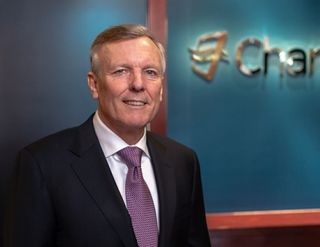Rutledge: 'Netflix Is Our Friend'

Charter Communications CEO Tom Rutledge said cable operators should embrace over-the-top video services because they highlight the value of their broadband offerings.
“Netflix is our friend, they drive broadband,” Rutledge said at the Goldman Sachs Communacopia conference in New York Wednesday. “We embrace OTT television because it makes our broadband superiority more clear in the eyes of consumers.”
Charter has added about 1.2 million broadband customers since Rutledge came on board in 2012, raised its minimum data speeds to 60 Megabits per second and revamped its programming packages to better fit consumer needs. With the addition of Time Warner Cable and Bright House Networks – deals that Rutledge believes still have a chance of closing by the end of the year – Charter will have significantly increased its scale to about 17.4 million customers.
With that added heft, Rutledge said he expects to grow video customers this year, despite added competitive pressures. Rutledge added he believes the additional pressure from OTT video is more driven by income and security issues.
Lack of income has always been an issue in cable, and can be addressed in part by more innovative video packaging. Security, or customers letting their kids or friends use their authentication passwords to essentially get free content, is another drag on the business. Rutledge wouldn’t say if Charter would crack down on password sharing, but he said that it is becoming a growing problem.
“I do think security of content is a real issue,” Rutledge said. “I think people who sell products in other [forms] need to understand that everything comes back to the home; there is no out of home marketplace. If you’re sitting on your couch looking at a phone, watching cable TV or watching something over WiFi or watching something over a cellular network, you may not know where it’s coming from. People who think they can sell things outside through mobile or something and it won’t come back to the home, they’re deluding themselves. We as network operators have to manage traffic, copyright in a way that is good for content companies. I do think they should re-affiliate with us in a positive way and there are opportunities there. One of the opportunities is making sure that when you sell a right, it goes where you sold it.”
As far as the trend toward offering skinny bundles, Rutledge said programming contracts offer some leeway to offer smaller content packages, but that for the most part Charter has held off from the practice.
Multichannel Newsletter
The smarter way to stay on top of the multichannel video marketplace. Sign up below.
“We tend not to sell those lesser services because we believe people want a really rich video package, along with a very high quality data service and a quality voice service and that the overall value proposition of all three of those products matter,” Rutledge said. “But there is room inside the current margins of thresholds of distribution to play with additional products.”
But the Charter chief said the current model continues to be the most efficient way to sell television.
“We don’t see the whole system falling apart,” Rutledge said. “We think that most content companies will be smart about the way they sell their content into the marketplace ultimately. I think people have made mistakes, clearly, and I do think there is truly over-the-top substitution, but I think there are other forces that affect the overall subscription model. I think both systems will reside side by side for a longtime.”
